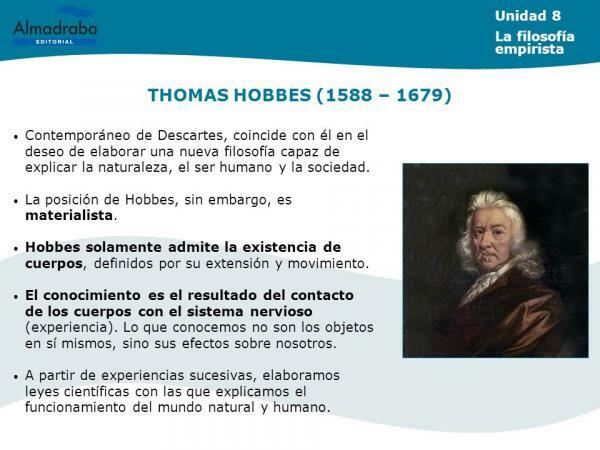Empiricism: most prominent philosophers

Image: Slideshare
In this lesson from a TEACHER, we will talk about empiricism, as well as the most prominent authors within this current, which has developed in England over the centuries XVII and XVIII Y versus rationalism, will defend that everything knowledge comes from experience, from the information provided by the senses or by mental activity itself, that is, reflection. Likewise, deny the existence of innate ideas. The mind is one clean sheet, like a blank sheet, and there is no other source of knowledge than experience, in it is the origin of it, but also its limit, because beyond the sensible experience, there is no possibility of knowing. If you want to know more, keep reading this lesson on leading philosophers of empiricism.
Index
- Thomas Hobbes, one of the philosophers of empiricism
- John Locke
- George Berkeley, another empiricist philosopher
- David hume
Thomas Hobbes, one of the philosophers of empiricism.
Thomas Hobbes
He is an English philosopher, born in 1588, Bacon's secretary, his philosophy is deeply influenced by the events of his time such as the revolution and the restoration of England. His best known work is, without a doubt, and the Leviathan, which is a defense of materialism and philosophical empiricism, moral utilitarianism and despotism in the political arena.Other important works are: De corpore, De homine, De cive… This philosopher, faced with the reformist environment of the time, will make a critique of freedom, which inevitably, he affirms, will lead to anarchy. “Man is a wolf to man”. He believes that the human being is bad by nature and therefore, out of fear, he is forced to constitute society. He affirms all knowledge comes from experience, therefore, his philosophy starts from phenomena, from things as they are perceived by the senses.

Image: SlidePlayer
John Locke.
John Lockehe is an english philosopher, scholar of the philosophy of Descartes, his most important work is "The Essay on Human Understanding", along with other works of a political nature such as"Treatise on civil government", or"Letters on tolerance".
He will defend that the origin of knowledge is experience, by means of perception, which he will divide into external perception, through sensation, and internal perception, through reflection, and they are inseparable. Likewise, he affirms that every sensation is associated with an idea, which he also divides into two: simple (from the sensation or reflection), and compound (reflection), a combination of simple ideas, and are based on the memory.

Image: Slideshare
George Berkeley, another empiricist philosopher.
George Berkeley is a philosopher and clergyman born in Ireland in the year 1685. The most representative books of him are "New essays on a theory of vision", "Three dialogues between Hylas and Filonus", "Principles of human knowledge" Y "Siris".
Like Locke, denies the existence of innate ideas, and also matter, which he understands as the result of sensible perception, and therefore, is nothing more than a representation. The only thing that exists, therefore, is consciousness, of which we have a certain and evident knowledge. Ideas, for the philosopher, come from the impressions of the senses or the product of a mental operation and are formed with the help of imagination and memory.

Image: SlidePlayer
David Hume.
And we finish this lesson on the most prominent philosophers of empiricism to talk aboutDavid humeScottish philosopher, historian and economist, born in Edinburgh (Scotland) in 1711. His main works are the "Treat of human nature", "An Enquiry Concerning Human Understanding"e"Research on the principles of morality".
His main contribution to philosophy is his theory of association of ideas. Hume is a radical empiricist who claims that ideas are nothing more than copies of direct impressions. We have, he says, a idea of substance, but there is no impression that corresponds to this idea. The only thing that exists are the accidents of the substance, of which we do have a sensitive impression.
If the idea of substance is not associated with sensation or reflection, then not I know corresponds with no print, and therefore it is false. The idea of substance is the product of imagination, that through the unification of simple ideas, and through the memory the idea of substance is built, based on the principle of causality, which according to this author, is nothing more than an imaginative prejudice. The principle of causalityIt is nothing more than an inference, from which conclusions are drawn from past events, but there is no impression of this at all.

Image: SlidePlayer
If you want to read more articles similar to Empiricism: most prominent philosophers, we recommend that you enter our category of Philosophy.
Bibliography
Diego Sánchez Meca. History of Modern and Contemporary Philosophy. Ed. Dykinson



